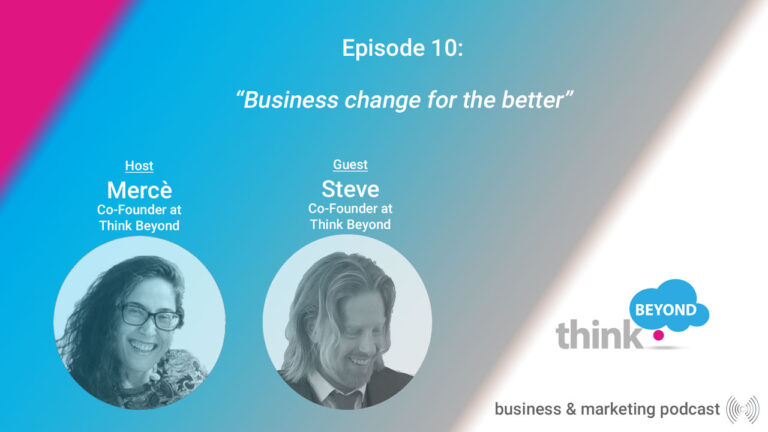Episode 10 in the series hears us discuss business change for the better, focused on planning and change. Not all change is good and not all changes are done well. So, after a run of illustrious guests, who should we turn to for episode 10? After 9 episodes of interviewing business experts, it’s time for Steven to take the hotseat.
A business and finance leader
After 20 years of working in business and finance, both as a finance director and as a business consultant, Steven knows a thing or two about business. He specialises in strategic planning, long-term planning and transformation. He also dabbles in financial control, customer and employee experience. In his words, “If you think that you have a business problem, I will go in and give you an honest view of what’s happening”.
Steven was a reluctant host of the podcast to start with. He reminisces that, “I didn’t see myself doing something like a podcast but I am adaptable in almost any situation.” We got to know a little bit about our other co-founder so tune-in to see what he had to say about himself.
Business change defined
As a first-time host and interviewer, our very own Mercè took hold of the microphone and launched into some meaty questions. First up, she asked about the definition of business change. Steven explained that he sees 3 types of business change beginning with operational change (doing things a little better) and finishing with strategic change (doing something differently in different markets). He summarised by saying that, “Transformation is more disruptive…doing what we do today, but a little bit better, does not lead to market leadership.” He cited the example of Apple, who have achieved long-term, sustainable competitive advantage. In the long-term, a lack of meaningful transformation ends up weighing on share price and market capitalisation. Steven elaborates that, “Investors can see that cost reduction, efficiency gains or merger and acquisition synergies are short to medium-term benefits that will run out eventually.”
Steven was also keen to point out that change and transformation are not all about productivity. He says that this misses the point and the main benefits.
Strategic planning for business change
Mercè went on to link business change to the theme of strategic planning, which Steven sees as the foundation for more detailed business planning. He then went on to summarise 3 main advantages and disadvantages of strategic planning. One major benefit of a strat plan is that, “You can start to think about the iterative process of an annual operating plans (AOP), medium-term plans (MTP) and long-term plans (LTP).”
Steven also cited a couple of disadvantages of strat plans. Namely that although it enables a business to “think about, challenge and review what the organisation is realistically capable of, what capacity and capability does it have, and to change the target operating model.” He also adds that, “…unfortunately, of course, not every business wants to go there and sometimes doesn’t want to admit the shortcomings.” Additionally, there is a real opportunity to bring an external point of view to strategic planning. This could be in the form of a third-party but also research into the industry, market, competitors and customers. Armed with this research, the strat plan perhaps has a greater chance of capitalising on opportunities.
Lean, Six Sigma and productivity change
The questions didn’t get any easier as Mercè tackled concepts such as Lean and Six Sigma. She posited whether many of these exercises are just a way to increase productivity. Steven disagreed and said that people had to look beyond the cost-saving motivation of such tools. He acknowledges that they can be used to cut costs but also that they can improve jobs and customer advocacy. He summarises that, “If staff can see that unnecessary tasks, steps in a process, delays, mistakes and errors are reduced, it improves the employee experience as well as the customer experience”. This is something that many businesses overlook. For teams, Lean can help to remove non-value add activities and make roles more rewarding. For customers, Six Sigma can help to improve the quality and value of what you receive.
Finishing with a question of attitude to change
To finish off, Mercè asked whether boards make enough use of research in their planning or do they “just do stuff”? In a final twist, Steven pondered if an ‘entrepreneurial mindset’, often seen as something to aspire towards, is an excuse to ‘just do stuff’. He explains that, “Many people just seem to, dare we say it, rush off and do it. Have a great idea then go and try it”. However, he points out that only a few get lucky and the majority of new ideas and initiatives fail (for a number of reasons). Additionally, Steven made reference to ‘unfounded big bets’, where management teams bank on internally-generated initiatives. He concludes by saying, “It really frustrates me how many companies gamble on these opportunities that fail to materialise – that’s pretty expensive.”
Wrapping up on a changed podcast
Thank you to both of our founders for hosting and answering questions in episode 10. Why not take this opportunity to check out our recent podcast from a successful female entrepreneur. There is also the highly successful deep-dive into ethical business and giving back. Finally, all of our podcasts are located in our learning and development articles.
Check out episode 10 on Anchor, Spotify or Google Podcasts using the links below.




